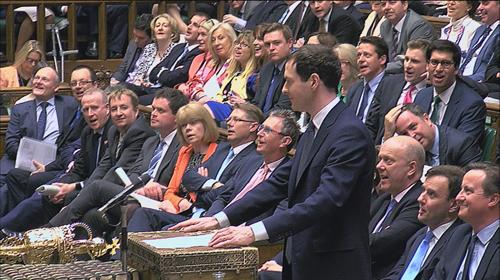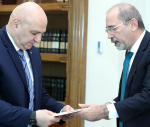You are here
UK finance minister warns of ‘dangerous cocktail’ of threats for 2016
By Reuters - Jan 10,2016 - Last updated at Jan 10,2016
LONDON — Finance Minister George Osborne said last week that Britain's economy was not immune from a "dangerous cocktail" of threats from abroad, and urged against complacency after two years of solid growth.
Osborne, whom Prime Minister David Cameron has named as a possible successor, said in a New Year's message that Britain faced headwinds from slower growth in China, Brazil and Russia as well as tensions in the Middle East.
"The economy has slipped down the list of many people's everyday concerns. But the biggest risk is that people think that it's 'job done'," Osborne said.
Britain has been the fastest growing of its peers for the past couple of years, but Cameron and Osborne regularly focus on the danger of economic mismanagement. Cameron spoke of "red warning lights" from the world economy in late 2014.
Since becoming finance minister in 2010, Osborne has made reducing Britain's large budget deficit his priority, and more than halved it to just under 5 per cent of the gross domestic product during his first five years in office.
In the run-up to May 2015's national election, Osborne said he wanted Britain to run a budget surplus in normal economic times, a goal the opposition Labour Party and many economists think is too stringent and risks hurting growth.
Public borrowing during the current financial year has come in above forecasts, raising doubts about whether Osborne will meet his most immediate fiscal goals.
Business surveys have also suggested the outlook for economic growth is darker than thought a few months ago. The British Chambers of Commerce said on Thursday that manufacturing exports had stagnated for the first time since 2009.
"This year opens with a dangerous cocktail of new threats," Osborne said. "We are only seven days into the New Year, and already we've had worrying news about stock market falls around the world, the slowdown in China [and] deep problems in Brazil and in Russia."
While a big fall in oil prices was good for most British consumers and businesses, it would hurt oil and gas output and investors who had lent to the sector, he added. Tensions between Saudi Arabia and Iran were also a worry.
Osborne made no mention of the referendum on European Union membership which Cameron has promised to hold before the end of 2017 but which many analysts expect to take place as early as June. They warn it could cause businesses to delay investment.
Senior bankers told lawmakers last week that Britain's financial sector has thrived in the European Union (EU) and quitting the 28-country bloc could limit access to a huge market and trigger an "investment pause" due to inevitable disruptions.
Britain is expected to hold a referendum on EU membership later this year.
Prime Minister David Cameron wants to keep Britain in the bloc if he can persuade other EU leaders to agree to his demands for reform before the vote, though he has cautioned he could campaign to leave if he doesn't get a deal.
Eurosceptic lawmakers have criticised Brussels for piling new rules on banks in Britain at the risk of making the sector less competitive globally.
Officials from two UK banks, HSBC and Barclays, said access to the EU's single market and its common rules was "crucial" and a key factor in London's success as Europe's biggest financial centre.
"Harmonisation does make it easier for us," James Chew, HSBC's head of regulatory policy, told parliament's Treasury Select Committee.
London's financial strength outside the EU would hinge on whether there was a "soft" or "hard" exit, meaning how accommodative terms of business would be with Europe, Chew said.
"We know that under any circumstances it's going to be a very big disruption," Chew added. "There will undoubtedly be some sort of investment pause."
HSBC could be forced to "realign" some operations on the continent if access to the single market was restricted following a British exit, Chew indicated.
It would take time for the economic consequences of a "Brexit" vote to sink in, such as whether China would focus on developing relations with the EU, rather than with Britain, he elaborated.
Mark Astaire, vice chair of Barclays' investment banking unit, said that while London had thrived within the EU and the single market was crucial, the capital would remain Europe's biggest financial centre in 10 years' time even if Britain left the bloc.
But Barclays' business customers say it makes sense to stay in the EU from an economic point of view, and an exit would be an expensive exercise for the bank and risks Britain being sidelined when it comes to shaping financial rules, he added.
HSBC and Barclays have begun Brexit contingency planning but Astaire and Chew were unable to give a figure for the costs of exit. The government should set out the terms of any exit ahead of the vote to help banks prepare, they said.
Some lawmakers argued Britain could create a more competitive financial services sector by setting its own financial rules outside the EU. HSBC is reviewing whether to keep its head office in London or move to Asia or elsewhere, partly to escape heavy regulation.
Chew said most EU rules were based on globally agreed principles, and Britain had introduced tougher versions in some cases.
The EU has imposed conditions on non-EU countries that want to do business in the single market, such as having equally strict regulation of their own.
Astaire said the ability of a Britain outside the EU to make radical changes to its financial rules would be quite limited.
"It would not be easy to go very far," agreed Chew.
Separately, two more investment banks have reported paying zero tax in Britain in 2014, prompting the opposition Labour Party to urge the government to reverse a tax change it made for banks last year.
Citigroup and Credit Suisse disclosed that their main UK subsidiaries paid no corporate income tax in 2014, the most recent year for which figures are available.
This means seven of the 10 biggest foreign investment and commercial banks operating in Europe's main investment banking centre have said their main British arms paid no tax in that year.
In total, the 10 banking groups generated over $40 billion in fees in Britain in 2014, reported $6.5 billion in profit and employed almost 50,000 people. But they contributed just $205 million in corporate income tax.
"These are damning findings that make a real mockery of the government's approach to taxation of the financial sector," said John McDonnell MP, the opposition Labour Party's shadow finance minister.
The other five banks, as reported by Reuters last month, are JP Morgan Chase & Co., Nomura Holdings Inc., Deutsche Bank AG, Bank of America Merrill Lynch and Morgan Stanley. All declined to comment. There is no evidence that they broke any tax rules.
Most companies engage in tax planning to manage their bills, and banking lobby groups say corporate income tax is just one of many taxes the investment banks pay. Britain benefits richly from income taxes on bankers' bonuses.
"The government believes it is crucial that the banks make a fair contribution to restoring stability to the public finances and has taken important steps to ensure they do this," a spokesman for the finance ministry said.
The tax authority said it ensures that all businesses pay tax due under British law, but declined to comment on the banks.
Bank levy
In July, following pressure from banks which threatened to move operations from London, Finance Minister George Osborne said he would halve a levy banks must pay as a percentage of their assets, and he would restrict the base on which it is calculated.
At the same time he increased the tax rate banks must pay on corporate income, to 8 percentage points above the standard rate.
Tax experts say corporation tax is easier to avoid than the bank levy.
McDonnell said the figures showed Osborne was already pursuing a "soft touch" approach. "This report should be setting off alarm bells at the Treasury and he should be reversing his decision on the bank levy immediately," he said.
Tax avoidance has become a hot political topic in Britain after revelations in recent years of profit shifting by big groups including Apple Inc. and Amazon.com. Last year, banks were required to disclose how much tax they have paid on profits generated country-by-country.
On December 31, 2015, Citigroup said that its two main UK subsidiaries had a combined profit of $308 million, but losses from the past reduced the tax it actually had to pay to zero.
Credit Suisse did not have a tax bill because it reported a loss in Britain for 2014. The bank reports most of its European profits in Switzerland, where effective tax rates can be much lower than in Britain.
Of the 10 biggest foreign investment banks measured by fee income, only three paid corporate income tax in 2014. Goldman Sachs Group Inc. paid $27 million in tax on $2 billion of profit generated by its London arm, while Switzerland's UBS Group AG paid $4 million on $140 million in UK profits. Both declined to comment.
The biggest taxpayer of the 10 was Paris-based BNP Paribas, which paid $174 million on $954 million profit generated by its UK unit, which focuses on investment and commercial banking.
"BNP Paribas is determined to do its civic duty in the field of taxation," the bank said in a statement.
It is not possible to compare the contributions of British banks including Barclays and HSBC, because even though they have large investment banking businesses, their country-by-country reports also include taxes paid on retail operations. Barclays declined to comment and no one from HSBC was available.
Related Articles
LONDON — Tougher rules aimed at holding top UK bankers to account when things go wrong are driving up pay, which smaller "challenger" banks
LONDON — British Prime Minister David Cameron took the unusual step on Sunday of publishing his tax records to try to end days of questions
LONDON — Britain unleashed more austerity this week in its latest annual budget and cut its growth outlook, blaming the impact of global mar















